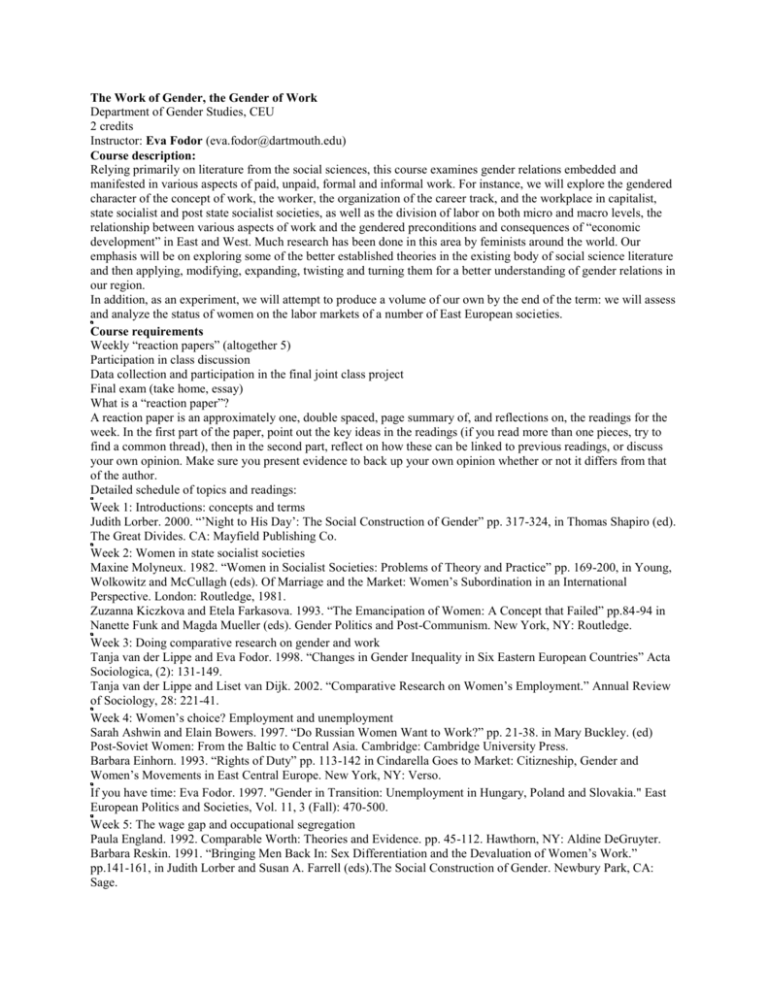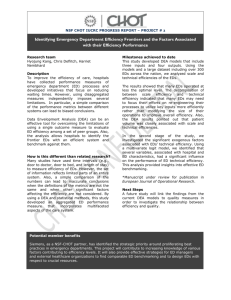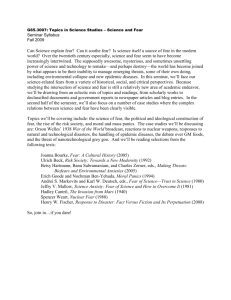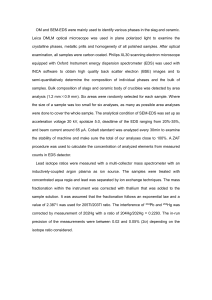The Work of Gender, the Gender of Work
advertisement

The Work of Gender, the Gender of Work Department of Gender Studies, CEU 2 credits Instructor: Eva Fodor (eva.fodor@dartmouth.edu) Course description: Relying primarily on literature from the social sciences, this course examines gender relations embedded and manifested in various aspects of paid, unpaid, formal and informal work. For instance, we will explore the gendered character of the concept of work, the worker, the organization of the career track, and the workplace in capitalist, state socialist and post state socialist societies, as well as the division of labor on both micro and macro levels, the relationship between various aspects of work and the gendered preconditions and consequences of “economic development” in East and West. Much research has been done in this area by feminists around the world. Our emphasis will be on exploring some of the better established theories in the existing body of social science literature and then applying, modifying, expanding, twisting and turning them for a better understanding of gender relations in our region. In addition, as an experiment, we will attempt to produce a volume of our own by the end of the term: we will assess and analyze the status of women on the labor markets of a number of East European societies. Course requirements Weekly “reaction papers” (altogether 5) Participation in class discussion Data collection and participation in the final joint class project Final exam (take home, essay) What is a “reaction paper”? A reaction paper is an approximately one, double spaced, page summary of, and reflections on, the readings for the week. In the first part of the paper, point out the key ideas in the readings (if you read more than one pieces, try to find a common thread), then in the second part, reflect on how these can be linked to previous readings, or discuss your own opinion. Make sure you present evidence to back up your own opinion whether or not it differs from that of the author. Detailed schedule of topics and readings: Week 1: Introductions: concepts and terms Judith Lorber. 2000. “’Night to His Day’: The Social Construction of Gender” pp. 317-324, in Thomas Shapiro (ed). The Great Divides. CA: Mayfield Publishing Co. Week 2: Women in state socialist societies Maxine Molyneux. 1982. “Women in Socialist Societies: Problems of Theory and Practice” pp. 169-200, in Young, Wolkowitz and McCullagh (eds). Of Marriage and the Market: Women’s Subordination in an International Perspective. London: Routledge, 1981. Zuzanna Kiczkova and Etela Farkasova. 1993. “The Emancipation of Women: A Concept that Failed” pp.84-94 in Nanette Funk and Magda Mueller (eds). Gender Politics and Post-Communism. New York, NY: Routledge. Week 3: Doing comparative research on gender and work Tanja van der Lippe and Eva Fodor. 1998. “Changes in Gender Inequality in Six Eastern European Countries” Acta Sociologica, (2): 131-149. Tanja van der Lippe and Liset van Dijk. 2002. “Comparative Research on Women’s Employment.” Annual Review of Sociology, 28: 221-41. Week 4: Women’s choice? Employment and unemployment Sarah Ashwin and Elain Bowers. 1997. “Do Russian Women Want to Work?” pp. 21-38. in Mary Buckley. (ed) Post-Soviet Women: From the Baltic to Central Asia. Cambridge: Cambridge University Press. Barbara Einhorn. 1993. “Rights of Duty” pp. 113-142 in Cindarella Goes to Market: Citizneship, Gender and Women’s Movements in East Central Europe. New York, NY: Verso. If you have time: Eva Fodor. 1997. "Gender in Transition: Unemployment in Hungary, Poland and Slovakia." East European Politics and Societies, Vol. 11, 3 (Fall): 470-500. Week 5: The wage gap and occupational segregation Paula England. 1992. Comparable Worth: Theories and Evidence. pp. 45-112. Hawthorn, NY: Aldine DeGruyter. Barbara Reskin. 1991. “Bringing Men Back In: Sex Differentiation and the Devaluation of Women’s Work.” pp.141-161, in Judith Lorber and Susan A. Farrell (eds).The Social Construction of Gender. Newbury Park, CA: Sage. Week 6: The construction of gender in the workplace Jennifer Pierce. 1997. Gender Trials. (selected pages). Berkeley, CA: University of California Press. Kathleen Staudt. 1994. “Strategic Locations: Gender Issues in Business Management” pp. 127-139. in Young, Samarasinghe and Kusterer (eds). Women at the Center. Kumarian Press. Week 7-8: The effects of “development” on women’s position in the labor market Moghadan, Valerie. 1993. “Bringing the Third World In: A Comparative Analysis of Gender and Restructuring.” Pp. 325-352. in Moghadan (ed). Democratic Reform and the Position of Women in Transitional Economies. Oxford: Clarendon Press. Susan Tiano. 1994. “Women and the New International Division of Labor” pp. 30-47. in Susan Tiano. Patriarchy on the Line: Labor, Gender and Ideology in the Mexican Maquila Industry. Philadelphia, PA: Temple University Press. IS HOUSEWORK WORK? Week 9: Paid domestic work: relations of exploitation among women Judith Rollins. 1985. Between Women: Domestics and Their Employers. pp. 155-203. Philadelphia, PA: Temple University Press. Week 10: The unpaid work of producing and reproducing the family Marjorie DeVault. 1991. Feeding the Family, pp. 35-57. Chicago, IL: University of Chicago Press. Suzanne M. Bianchi, Melissa A. Milkie, Liana C. Sayer and John P. Robinson. 2002. “Is Anyone Doing the Housework? Trends in the Gender Division of Household Labor” pp. 174-188, in Paula J. Dubeck and Dana Dunn (eds). Workplace/Women’s Place. Los Angeles, CA: Roxbury. Recommended: Heidi I. Hartmann. 1987. “The Family as the Locus of Gender, Class, and Political Struggle: The Example of Housework.” In Sandra Harding (ed). Feminism and Methodology. Bloomington, IN: Indiana University Press. Week 11: Work and family “balance”? Kathleen Gerson. 2002. “Combining Work and Motherhood.” Pp. 146-162, in Paula J. Dubeck and Dana Dunn (eds). Workplace/Women’s Place. Los Angeles, CA: Roxbury. Arlie Hochschild. 2002. “The Time Bind” pp. 188-197, in Paula J. Dubeck and Dana Dunn (eds). Workplace/Women’s Place. Los Angeles, CA: Roxbury. David J. Maume Jr and Marcia L. Bellas. 2002. “Do Workers Prefer the Workplace to Home?: And Empirical Assessment of “The Time Bind”. Pp 197-205, in Paula J. Dubeck and Dana Dunn (eds). Workplace/Women’s Place. Los Angeles, CA: Roxbury. Week 12: Summary and conclusions Kathryn P. Meadow Orlans and Ruth A. Wallace (eds). 1994. Gender and the Academic Experience: Berkeley Women Sociologists. Chapter 10. Lincoln: University of Nebraska Press. Joan Acker. 1991. “Hierarchies, Jobs, Bodies: A Theory of Gendered Organizations” pp.162-179, in Judith Lorber and Susan A. Farrell (eds).The Social Construction of Gender. Newbury Park, CA: Sage.






